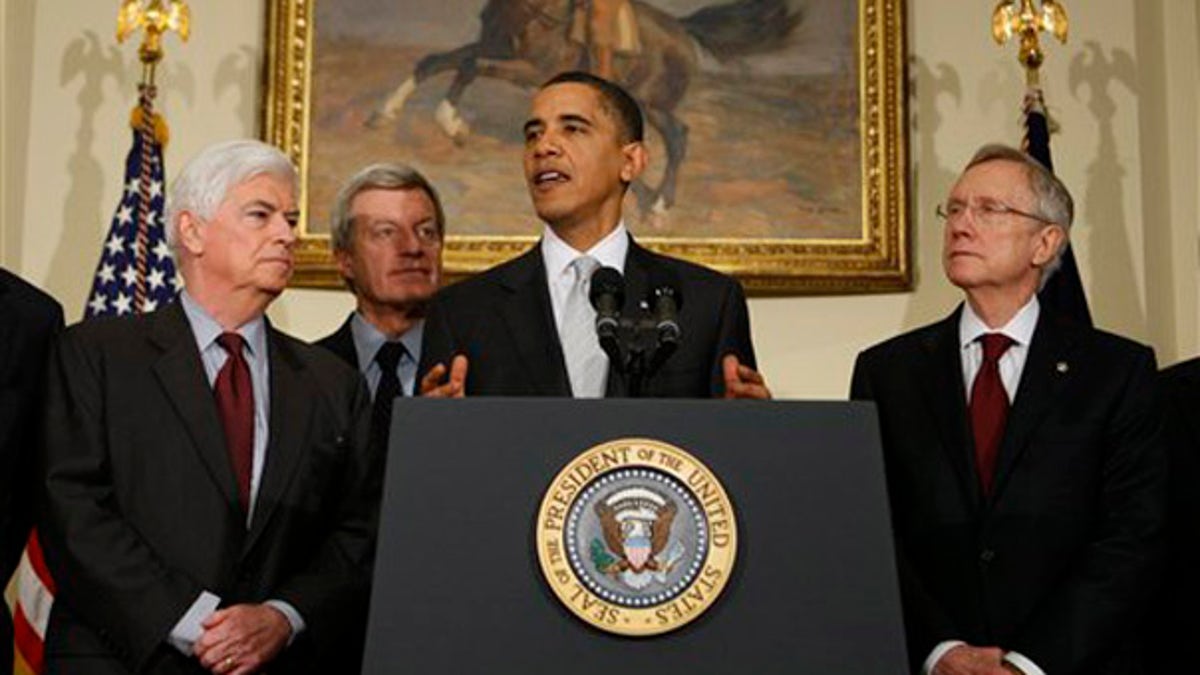
President Obama makes a statement on health care reform after meeting with senators, Tuesday, Dec. 15, 2009, at the White House. (AP)
WASHINGTON -- After meeting with Senate Democrats at the White House in an effort to cement support for his top domestic priority, President Obama said Tuesday that they were on the verge of passing historic legislation to overhaul the U.S. health care system.
"From the discussions we had, it's clear we are on the precipice of achievement that's eluded Congresses, presidents for generations -- an achievement that will touch the lives of nearly every American," Obama said.
"There are still some differences that have to be worked on," he said. "But whatever differences remain, there is broad consensus around reform."
Obama added that he is "cautiously optimistic" the bill will be passed.
Obama said he told the senators that the party cannot let differences over individual portions of the overhaul measure kill overall attempts to reform the system. He said the measure, no matter what its final form, will be the greatest legislative achievement on health care since the passage of Medicare four decades ago.
Earlier, Sen. Joe Lieberman, who has sent Democratic leaders and the White House scrambling in recent days to find a compromise that would win his support for the legislation, signaled that their efforts have nearly succeeded.
"I'm getting to a position where I can say what I wanted to say all along: that I'm ready to vote for health care reform," the independent from Connecticut told reporters Tuesday.
Lieberman had threatened to join Republicans in throwing the legislation off the tracks if Democrats included a proposal to expand Medicare -- a compromise that would have replaced a government-run insurance program that liberals have long sought.
Obama needs every member of the Democratic caucus to hang together to give him the 60 votes required to overcome Republicans united in opposition to the sweeping health overhaul measure.
"I think we're headed in the right direction," Lieberman said. "My whole point has been here, the president laid out a couple of big goals for this process. Bend the cost curve down for individuals, families, businesses, our government, our economy and health care.
"Secondly, bring in a lot of people who can't afford health insurance now. The basic core bill does that."
Lieberman's statement followed a closed-door senators-only meeting of the Democratic caucus called to consider trade-offs necessary to assure 60 votes for the bill. Medicare is the government program providing health care benefits to the elderly.
"Put me down tonight as encouraged about the direction these talks are going," Lieberman, said late Monday, only 24 hours after he rattled Democrats with his threat.
But some Democrats, while hopeful a deal can still be reached, expressed frustration with the latest revolt from Lieberman, who campaigned heavily against Obama last year in the presidential election.
"To often, it appears that the psychology in the Senate is the psychology of one," House Majority Leader Steny Hoyer of Maryland told Fox News when asked about Lieberman, without mentioning the senator by name.
"(Senate Majority Leader Harry) Reid doesn't have the votes for a public option," Hoyer lamented. "In a world of alternatives, you focus on what you can get."
Sen. Ben Cardin of Maryland told Fox News Tuesday that he's frustrated at the lack of progress on a pubic option..
"We're trying to get this bill done," he said. "I can't tell you that I'm angry. I'm a little bit frustrated that we've been negotiating and we haven't been able to nail down an agreement on the public option.
"However I think we're very close," he added. "I think we're going to get it done before Christmas and I think Joe Lieberman will be supporting the bill. So this is all part of the process and we're going to work out our differences."
Reid promised to deliver a deal before Christmas.
"I'm confident that by next week we will be on our way toward final passage of a bill that saves lives, saves money and saves Medicare," Reid told reporters after Monday night's meeting.
Liberals had sought the Medicare expansion as a last-minute substitute for a full-blown, government-run insurance program that moderates insisted be removed from the legislation. But it drew strong opposition from Lieberman and quieter concerns from other Democrats -- all of whom hold votes essential for passage.
Reid did not say flatly that Democrats had decided to drop the proposal for uninsured Americans as young as 55 to purchase coverage under Medicare, the government program now open to people when they turn 65. But several senators said it appeared inevitable.
"We're not going to get all that we want but we're going to get so much more than we have," liberal Sen. Jay Rockefeller of West Virginia said.
There was no let-up in Republican criticism.
Sen. Mitch McConnell, the party's leader, said the legislation includes "a half a trillion dollars in cuts in Medicare, $400 billion in higher taxes and higher premiums for everyone else."
The overall measure, costing nearly $1 trillion over a decade, is designed to expand coverage with a new requirement for nearly everyone to purchase health insurance, and ban industry practices such as denying coverage on the basis of pre-existing medical conditions. Obama also has urged Congress to slow the growth in health care spending nationally; several days after Reid submitted a package of revisions, lawmakers awaited final word from the Congressional Budget Office on that point.
Disputes over abortion and the importation of prescription drugs from Canada and other countries also simmered as the Senate entered a third week of debate on the legislation.
Sen. Byron Dorgan, a North Dakota Democrat, led the effort to lift a long-standing ban on the importation of prescription drugs from Canada and elsewhere. Obama favored the plan as a senator, but the pharmaceutical industry is opposed, and the White House appeared anxious not to jeopardize a monthslong alliance with drug makers who have been helpful in trying to pass the overhaul. A vote was set for late Tuesday.
The obstacle that loomed largest was the Medicare expansion proposal, vestige of a monthslong debate over the role of government in the newly revised health care system. It emerged last week as part of a framework agreement between moderates and liberals. Additionally, the proposal calls for creation of nationwide plans run by private insurance companies under the supervision of the Office of Personnel Management, which oversees health plans for members of Congress and other federal workers.
The two provisions were seen as a replacement for Reid's initial call for a government-run insurance plan to compete with private industry, a liberal priority opposed by moderates as an unwanted government intrusion. The one unrelated to Medicare is expected to survive, but without standby authority for the OPM to set up a government-run plan if no private coverage options materialize.
Opposition to the Medicare change blossomed from doctors and hospitals, who are paid less to treat Medicare patients than those covered by private insurance companies.
Fox News' Chad Pergram and The Associated Press contributed to this report.




